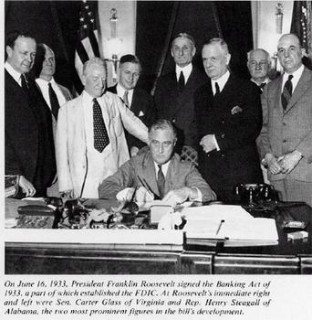By Simon Johnson
The official reconciliation process between Senate and House reform bills will get underway next week, but the behind-the-scenes maneuvering (and intense lobbying) is already well underway. The main remaining question is whether the final legislation will ultimately make the financial system at all safer than it was in the run up to the crisis of September 2008.
How do big banks repeatedly get themselves into so much trouble? Dangerous banking in today’s world involves banks trading securities and, in that context, taking positions – i.e., betting their own capital. For example, almost all the profits made by big banks in 2009 came from securities trading. When market conditions are favorable and traders get lucky, the people running these banks (and hopefully their shareholders) get tremendous upside. But when this same risk-taking behavior results in big losses, the major negative impact is felt in terms of a major recession, raising government debt, and sharply lower employment.
“Wall Street gets the upside, and society gets the downside” is an old saying that is now more relevant than ever. This asymmetry in incentives explains how smart people with concentrated financial power can cause so much damage – according to, for example, the Bank of England’s analysis.
The derivatives market is the arena where much of this risk-taking activity occurs. And while the financial regulatory reform bill makes some efforts to bring the derivatives market onto exchanges – although the exemptions granted are far too sweeping – it does disappointingly little to separate out risky trading from critical banking infrastructure, i.e., the payments system and relatively boring parts of traditional retail and commercial banking without which any modern economy cannot operate.
An earlier version of this risky-boring split is exactly what inspired the Glass-Steagall legislation of the 1930s and, while these specific arrangements had drawbacks and ultimately broke down, they did serve the US economy well for close to 50 years. (We review exactly what happened to Glass Steagall and why in 13 Bankers.)
The spirit of the reforms advocated by Paul Volcker – and championed, at least in principle, by the administration – is to update and apply the principles behind Glass-Steagall (links to more details: Volcker’s original policy push and his current thinking). We need to separate the relatively high risk parts of banking from the relatively boring and safer parts that are essential to the payments system and to the routine credit needs of households and business.
There are two provisions that are currently under consideration for the “reconciliation” between Senate and House versions of regulatory reform that seek to address this problem, and while each is valuable, they come at the problem from different directions.
Senator Blanche Lincoln’s approach – which focuses exclusively on derivatives trading (the purview of the Agriculture Committee, which she chairs) – would require banks to set up separate subsidiaries, within which they would need to hold a great deal more capital against their trading books. In this way, the Lincoln approach addresses all derivatives trading, including the use of proprietary capital.

The “Lincoln amendment” would have real teeth and – if properly implemented by regulators – would make derivatives trading substantially less risky. It would also make such trading less profitable – requiring more capital to be held against downside losses will also reduce the extent of upside profits; this is a feature, not a bug. Big Wall Street banks are naturally furious and fighting hard – with all the lobbying power and potential campaign contributions at their disposal to ensure that profits prevail over social considerations (that’s their job, after all). Unfortunately, all the indications are that the megabanks will prevail and the Lincoln amendment will be completely stripped from the final bill.
Senators Jeff Merkley and Carl Levin would go a considerable distance in the same direction, although with greater focus on separating out – and not allowing, if regulators follow through – the “proprietary” (own capital) bets that recently crippled even the biggest banks. Remember that Bear Stearns and Lehman were broken by their holdings of toxic real estate-related assets, while Citigroup, Bank of America and others were brought low by wrongly believing that certain kinds of derivatives were good bets.
The Merkley-Levin approach leaves client-focused trading (buying and selling securities for others) where it is now within the big banks, but it would exclude the inappropriate use of proprietary capital across all types of financial instruments – not just derivatives. The Merkley-Levin amendment gathered great momentum in the Senate and would almost certainly have prevailed in a floor vote – but through some unpleasant parliamentary maneuvering (at the instigation of the banking lobby, presumably), it was denied such a vote.
Within the reconciliation process, Merkley-Levin still has a chance, although the precise odds depend on how hard the White House wants to fight. The president announced the Volcker Rules to great acclaim in late January, but unfortunately the detailed follow up by his own team was lackluster at best. Senators Merkley and Levin stepped into the political and legislative gap, pushing hard for at least some version of the Volcker principles to be adopted in Senator Dodd’s bill.
They were turned back at every stage, but have remained doggedly on message. Ultimately, this comes down to President Obama. Is he will to really put his political capital seriously into play? Or is his new found (and oil spill inspired) rhetoric against runaway corporate power and pathetic regulation at best completely empty and at worst a smokescreen for continued abuses?
We will learn a great deal in the coming weeks, not just about the future stability of our financial system, but also for what President Obama really stands.
ATTENTION READERS
We See The World From All Sides and Want YOU To Be Fully InformedIn fact, intentional disinformation is a disgraceful scourge in media today. So to assuage any possible errant incorrect information posted herein, we strongly encourage you to seek corroboration from other non-VT sources before forming an educated opinion.
About VT - Policies & Disclosures - Comment Policy




